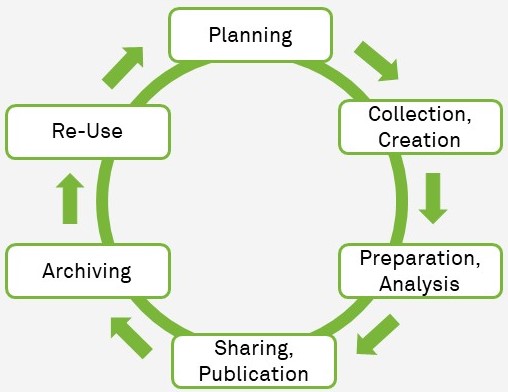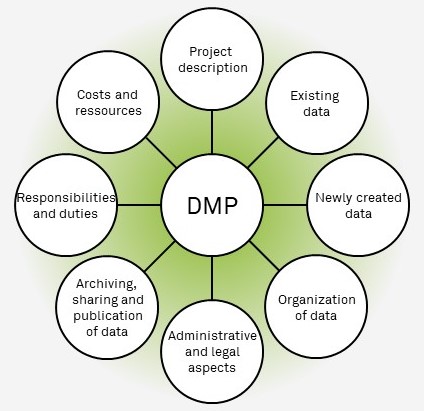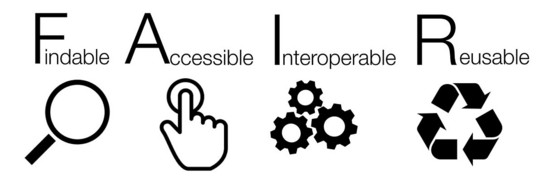What is research data management?
Research data management (RDM) combines the organization, structure, documentation, publication and secure (long-term) storage of research data. It is thus the basis for effective subsequent use of one's own research data for oneself or for others. For initial orientation these pages explain core concepts and terms of research data management. The Research Data Service will be happy to answer any further questions.

Research data is the result and basis of scientific work in all research disciplines and can occur in all formats and forms. Nowadays, research data is predominantly digital and can be very extensive. This increases the data management demand. In the following, you will find informaion of what research data management is and how you can develop your own strategy for handling your data.
Research data management (RDM) is a central requirement of the German Research Foundation (DFG), summarized in the "Rules of Good Scientific Practice".
RDM summarizes all concepts that help to structure, organize, document, secure, archive and share one's own research data. Already during the project planning phase, the used measures to be applied should be summarized in a data management plan so that they are applied consistently during the course of the project. This ensures efficient handling of data, supports retrieval and sharing as well as the publication of research data and results.
Even before the project starts, an RDM concept should be developed that governs the handling of research data generated in the project and leads to efficient data management. Data management plans (DMP) are suitable for achieving this. This can save you a lot of time and nerves at the end of the project. A proven tool for creating, managing and sharing DMPs is the Research Data Management Organizer RDMO.
RDM provides you with the concepts for sustainable handling of research data, however, you decide for yourself whether and when you want to share research data with colleagues or third parties. By applying RDM concepts, sharing or publishing research data for third parties is facilitated, but not mandatory.
A consistent application of RDM makes it possible to disclose the entire research process, which in turn can be incorporated and further developed by other researchers. This transparent availability of knowledge is called Open Science and needs to be distinguished from RDM.
The topic of research data management is becoming increasingly important in the acquisition of third-party funding. More and more third-party funders are demanding detailed information on the handling of research data:
- The DFG has recently started demanding comprehensive information on how to handle the research data used in the respective project.
- For BMBF applications, depending on the funding line, complete data management plans (DMP) are required, in which very detailed information on the handling of research data must be provided.
- Foundations such as the Volkswagen Foundation (german: Volkswagen Stiftung) require data management plans when applying for funding.
- In the EU's H2020 funding program, data management plans are also required when submitting an application, and the publication of research data in a repository is expected.
In addition to the RDM sub-aspect, the Research Support Services supports you in applying for third-party funding in the form of strategic feedback and by accompanying you through the university-internal application process. Please feel free to contact the Research Support Service team.

A data management plan (DMP) is a central document that summarizes all information and planned actions for managing research data within a project.
There are different ways to create a DMP. For example, the RDM concept can be outlined using guiding questions in a document or table. This is mainly the case if a third-party funder provides such a template to generate a DMP for the application process. In addition, it is also possible to create a DMP using the Resarch Data Management Organizer (RDMO). RDMO is a web tool that allows the collaborative creation of a DMP based on a questionnaire. With the help of RDMO, the individual workload can be minimized. RDMO is suitable for all types of projects, from PhD projects to collaborative projects such as CRCs/TRRs.
A DMP generated before the start of the project thus helps to clarify important questions before the project begins and thus protects you from unpleasant surprises.

Data management should always follow FAIR principles. This means that the generated research data should be
- Findable
- Accessible
- Interoperable
- Re-usable.
For the implementation of the FAIR principles, subject-specific repositories are suitable, for example, in which the data are stored in an open format (interoperable) and described by metadata (findable). By assigning persistent identifiers (e.g. DOI, handle, etc.), these data can be cited for subsequent use, and the repository's rights management ensures accessibility.
The FAIR principles are not to be confused with Open Data; the FAIR principles merely ensure that the data are stored in a way that is comprehensible, accessible and usable for a specific group of people. The principle applies: as open as possible, as closed as necessary.
For more information on the FAIR principles and their implementation in everyday science, see the publication The FAIR Guiding Principles (or the German publication "The FAIR Principles for Scientific Data Management and Data Stewardship").
In order to store the data in the long term, the IT and Media Center (ITMC), in cooperation with the Universitätsallianz Ruhr, provides a research data repository in which your research data is securely stored for a period of at least 10 years. Unauthorized access to your data is prevented by a rights management system.
In principle, research data should be stored on a central server, access should only be granted to authorized users and the data should be backed up regularly. Data should be backed up according to the 3-2-1 rule: 3 copies on 2 media, with at least 1 copy stored spatially separated.
TU Dortmund University offers an infrastructure for safely storing research data with the data repository TUDOdata. In TUDOdata, the data is provided with metadata, making it easier to find. In addition to being stored for 10 years in accordance with the rules of good scientific practice, the research data can also be published in TUDOdata: this means that the data and metadata are publicly accessible and can be persistently referenced using a DOI
In everyday research, the documentation of research data is primarily carried out by means of free text documents, such as (laboratory) notebooks. However, the use of this information is limited because information is not machine-readable and searchable. Using electronic laboratory notebooks remedies this by making the documentation of your research searchable , assignable to projects, and shareable with collaboration partners. Electronic lab notebooks are of course only of interest to a subset of researchers at TU Dortmund University, but there are also other solutions.
The use of metadata to describe and document your research data ensures its retrievability and traceability. Metadata contains defined elements, such as the author, the (project) affiliation, the date of creation, but also important parameters which are necessary to understand the data, up to an abstract of the project. By using such a structured metadata schema, the information is stored in an orderly and generally understandable way; a clear advantage over free text documentation.
We are happy to support you in identifying or help you creating a metadata schema tailored to your needs.
Research projects including personal data are subject to legal regulations. Before you start a project with personal data, you should contact Ralf Offele, the data protection officer at TU Dortmund University (send e-mail), to clarify your plan and any pitfalls before the project begins. A data management plan that has already been prepared will help you explain the project and get a qualified assessment of the situation.
For general information on the topic "Data protection for research data" please take a look at a summary of all the important information (in German). Please keep in mind that this information does not replace the qualified assessment of a data protection officer.
Cloud solutions are particularly suitable for a collaborative sharing of research data. This makes it easy to synchronize and exchange data.
Since the locations of cloud servers provided by commercial companies, and thus the right to the data is not always transparent to the public, some researchers have reservations about using cloud solutions for sharing their research data.
For this purpose, the NRW cloud solution Sciebo is a suitable option, where you can share research data and create and edit documents together. All universities from NRW have access to Sciebo, and guest accounts can be created for collaborations outside NRW.
An alternative to Sciebo is B2DROP, which is aimed at EU researchers who want to exchange research data. The service is currently provided by the Jülich Supercomputing Centre (JSC) and data storage is provided according to German legislation.
When archiving research data, a distinction is made between the secure and usable storage of research data for a period of 10 years in accordance with the rules of good scientific practice (archiving) and long-term storage for periods of more than 25 years.
This poses special challenges for your data. Archived data should be in an open, non-proprietary format if possible. If migration to an open format is not technically feasible, then the software used to create or open the data should also be archived. If necessary, the entire software environment must be archived (virtualization) to ensure the usability of the research data. This involves a great deal of effort, which is why archiving the data should be taken into account even before the project begins.
Long-term storage poses even more technical barriers, as software and hardware change significantly over a period of more than 25 years. Keeping data usable over such a long period requires constant migration to usable data formats. Technical solutions, such as Rosetta, take care of this step for you, but the formats supported so far are limited.
Repositories are data- and document servers where scientific research results in the form of publications and datasets can be stored and made accessible. By assigning metadata, it is possible to make these (data) publications findable via search engines. Usually, a persistent identifier is also assigned (DOI), so that the publication is linked sustainably. There are subject-specific and interdisciplinary repositories which can be found via the search engine Registry of Research Data Repositories (re3data). The Research Data Service of the TU Dortmund University will be happy to help you choose a suitable repository.
TU Dortmund University also operates two repositories:
- TUDOdata is TU Dortmund University's data repository. Here, members of TU Dortmund University can securely store research data and results and make them available to other researchers. Instructions with a collection of frequently asked questions can be found here.
- Eldorado is primarily designed for the storage and publication of documents and publications.
The relevance of data as a basis for sustainable science and the difficulty of finding interdisciplinary solutions has also been recognized politically. Commissioned by the Joint Science Conference (German: Gemeinsame Wissenschaftskonferenz - GWK), the German Council for Scientific Information Infrastructures (Rat für Informationsinfrastrukturen - RfII) proposed the establishment of a National Research Data Infrastructure (Nationale Forschungsdateninfrastruktur - NFDI) in 2016. Funded by the federal and state governments, the NFDI is currently emerging as a nationwide network of expertise and infrastructures that will ensure the provision and indexing of research data for science.
The Principles of Research Data Management at TU Dortmund University explain the self-conception and responsibility of researchers at TU Dortmund University in dealing with data. If you need help with the implementation, please contact the Research Data Service of TU Dortmund University. Together we will develop a concept, in order to apply the Principles of Research Data Management to your research process.
Services and contact persons
The Research Data Service of TU Dortmund University supports all researchers in handling their data - from doctoral projects to collaborative projects. We are happy to advise you on all questions regarding the handling of research data. Based on your needs, we will jointly develop a strategy to ensure the sustainability of your research data along the rules of good scientific practice. Feel free to contact us via our central e-mail address and arrange a consultation appointment.


